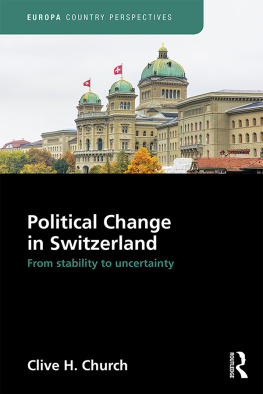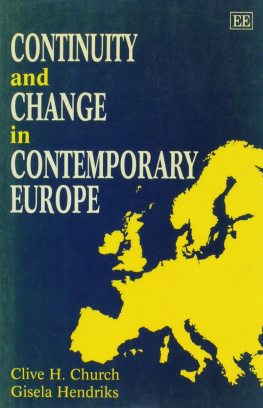Political Change in Switzerland
Political Change in Switzerland: From stability to uncertainty focuses on the way, so often overlooked, that Swiss politics have altered from the very stable and relatively untroubled times of the early 1980s to todays more unsettled and divided situation. It highlights the way that internationalization has imposed new stresses on Switzerland, both internally and externally. These stresses have, in turn, encouraged the growth of divisive new politics, domi-nated by an unusual and powerful populist movement, with new social bases and efficiently employing aggressive tactics. This has created a formidable challenge to the status quo which the Swiss establishment finds hard to counter. As a result, Switzerland faces two linked policy problems: how to find ways of accommodating unease about immigration and how to devise a realistic and acceptable new relationship with the European Union. These challenges have yet to be resolved, leaving the country less stable and more uncertain than it has been for many years.
Clive H. Church is Emeritus Professor of European Studies at the University of Kent in Canterbury, England. Educated as a historian at Exeter and London Universities, he has taught History, European Studies and Politics at Trinity College Dublin, the University of Lancaster and the University of Kent. He has been visiting and working on Switzerland since 1971. He is the author of The Politics and Government of Switzerland (Palgrave, 2004), an edited volume on Switzerland and the European Union (Routledge, 2007) and (with Randy Head) of A Concise History of Switzerland (Cambridge, 2013). He has also written widely on European history, integration and the EU treaties.
Europa Country Perspectives
The Europa Country Perspectives series, from Routledge, examines a wide range of contemporary political, economic, developmental and social issues from areas around the world. Complementing the Europa Regional Surveys of the World series, Europa Country Perspectives will be a valuable resource for academics, students, researchers, policymakers, business people and anyone with an interest in current world affairs.
While the Europa World Year Book and its associated Regional Surveys inform on and analyse contemporary economic, political and social develop-ments at the national and regional level, Country Perspectives provide in-depth, country-specific volumes written or edited by specialists in their field, delving into a countrys particular situation. Volumes in the series are not constrained by any particular template, but may explore a countrys recent political, economic, international relations, social, defence, or other issues in order to increase understanding.
Haiti: From Revolutionary Slaves to Powerless Citizens
Essays on the politics and economics of underdevelopment, 18042013
Alex Dupuy
Darfurs Political Economy
A quest for development
Hamid Eltgani Ali
Contesting Spain?
The dynamics of nationalist movements in Catalonia and the Basque Country
Edited by Richard Gillespie and Caroline Gray
Catalonia: A New Independent State in Europe?
A debate over secession within the European Union
Edited by Xavier Cuadras-Morat
Russian Nationalism and Ethnic Violence
Symbolic violence, lynching, pogrom, and massacre
Richard Arnold
Political Change in Switzerland
From stability to uncertainty
Clive H. Church
Political Change in Switzerland
From stability to uncertainty
Clive H. Church
First published 2016
by Routledge
2 Park Square, Milton Park, Abingdon, Oxon OX14 4RN
and by Routledge
711 Third Avenue, New York, NY 10017
Routledge is an imprint of the Taylor & Francis Group, an informa business
2016 Clive H. Church
The right of Clive H. Church to be identified as the author of the editorial material has been asserted in accordance with sections 77 and 78 of the Copyright, Designs and Patents Act 1988.
All rights reserved. No part of this book may be reprinted or reproduced or utilised in any form or by any electronic, mechanical, or other means, now known or hereafter invented, including photocopying and recording, or in any information storage or retrieval system, without permission in writing from the publishers.
Trademark notice: Product or corporate names may be trademarks or registered trademarks, and are used only for identification and explanation without intent to infringe.
Europa Commissioning Editor: Cathy Hartley
Editorial Assistant: Eleanor Simmons
British Library Cataloguing in Publication Data
A catalogue record for this book is available from the British Library
Library of Congress Cataloging in Publication Data
A catalog record for this book has been requested
ISBN: 978-1-85743-780-5 (hbk)
ISBN: 978-1-31569-567-9 (ebk)
For Clare
I am very grateful to Cathy Hartley and her colleagues at Europa Routledge for giving me the chance to reflect, one more time, and in more detail, on the profound but so often overlooked changes which have taken place in Swiss politics over the last 30 years. Trying to explain what has happened in Switzerland, why it came about and why it matters is a task ideally suited to the Europa Country Perspectives series. This offers the possibility of detailed scrutiny and analysis of recent developments in one of Europes most significant but most unusual and least understood countries. I hope that readers will find the outcome of this investigation as stimulating as was the researching, thinking and writing on which it is based.
However, this is not really a work of personal research. It is heavily dependent on the Swiss press, on Swiss politicians and especially on the work of Swiss academics. Essentially, it is a synthesis of the research and thinking of Swiss political scientists, whose numbers, productivity and insights have soared in recent years, albeit often without the rest of the academic world noticing. I have tried to bring their work to the notice of English-speaking readers, in a form that speaks to them. At the same time I have tried to set Swiss developments in the context of wider European politics and theorizing.
And I must also thank all those Swiss academics and politicians who have given me so much help and access, not just in the last few months, but over many years. I am immensely grateful to them. Without them I could not have done it. Equally I owe incalculable debts to friends like Bettina Hurni, Franois Jequier, Rachel Liechti, Thomas Metzger and Michel Walter for all their encouragement, support and inspiration over the years. They have helped to make Switzerland a place of friendship as well as of study.
In particular I must thank Adrian Vatter and his family for offering me a home from home in his remarkable attic, along with innumerable meals. I am also very grateful to him for providing me with an unparalleled sounding board, an inexhaustible source of references and unfailingly helpful insights and support, not to mention for introducing me to F. C. Breitenrein.
Finally, last, but very definitely not least, I have to thank Clare for bringing me so much happiness generally, for allowing me to introduce her to Switzerland (adding to my enjoyment in so doing) and for putting up with both my Swiss obsessions and with my interminable hours on the computer. I hope she will find this a fair return.










